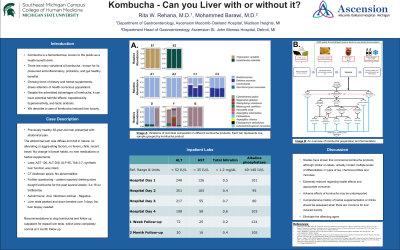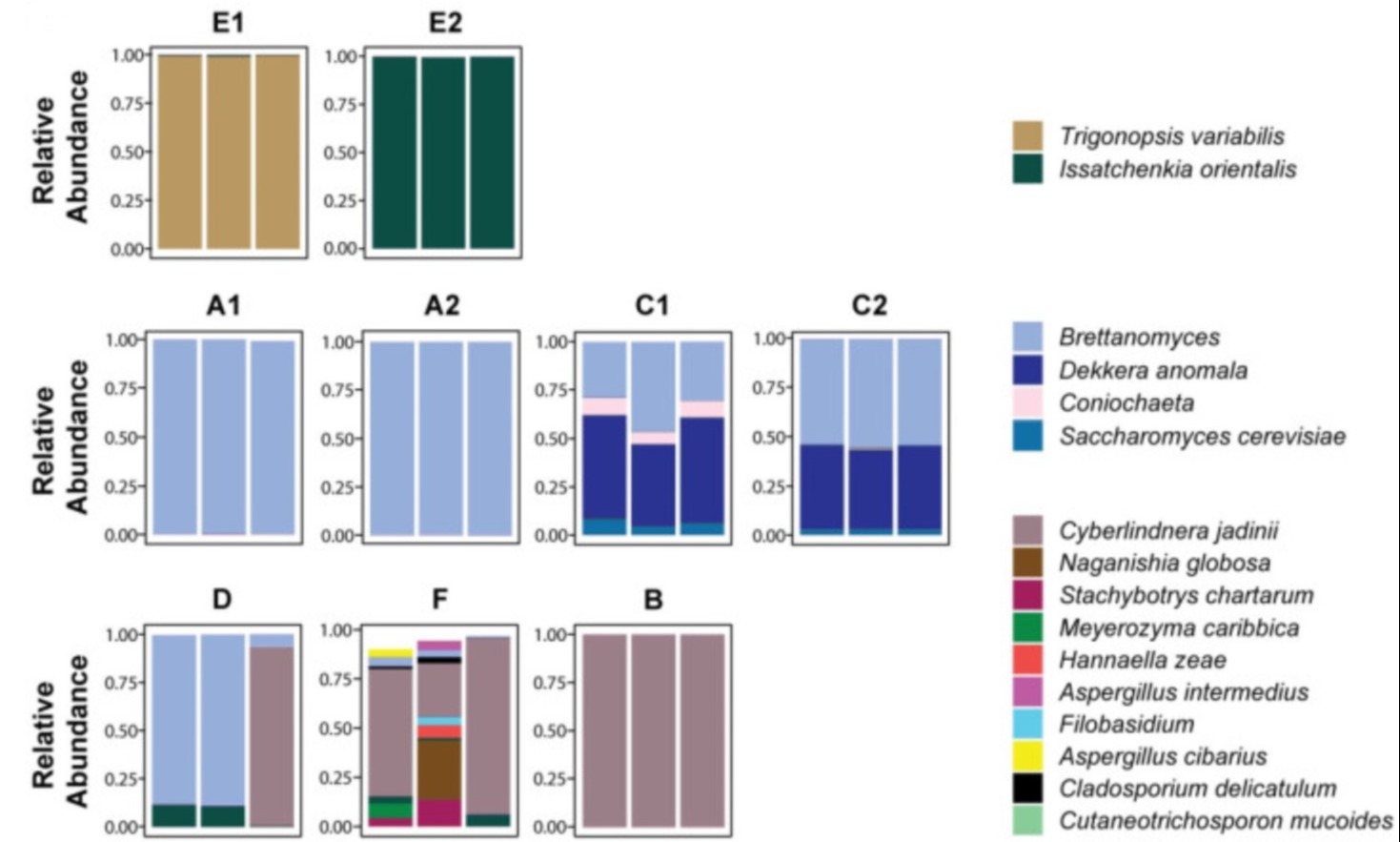Monday Poster Session
Category: Liver
P3105 - Kombucha: Can You Liver With or Without It?
Monday, October 28, 2024
10:30 AM - 4:00 PM ET
Location: Exhibit Hall E

Has Audio

Rita Rehana, MD
Ascension Macomb-Oakland Hospital
Royal Oak, MI
Presenting Author(s)
Rita Rehana, MD1, Mohammed Barawi, MD2
1Ascension Macomb-Oakland Hospital, Royal Oak, MI; 2Ascension St. John Hospital, Detroit, MI
Introduction: Kombucha is a fermented tea, known to the general public as a health benefit drink. Although many variations of kombucha are available, it is generally known for its presumed anti-inflammatory, probiotic, and gut healthy benefits. Due to the growing trend of dietary and herbal supplements this draws the attention of health-conscious populations. Despite the advertised advantages of drinking kombucha, it can have potential harmful effects such as hypersensitivities, hepatotoxicity, and lactic acidosis. We describe a case of kombucha induced liver toxicity.
Case Description/Methods: A previously healthy 38-year-old man presented to the hospital with abdominal pain, further described as diffuse and dull in nature, not associated with any alleviating or aggravating factors. He reported associated chills but no fever. He denied changes in bowel habits, weight, recent travel/illness, or sick contacts. Initial vitals were normal. Exam revealed a benign abdomen. CT showed no significant intraabdominal abnormalities. Admission labs were significant for AST 126 IU/L, ALT 208 IU/L, alkaline phosphatase 95 IU/L, total bilirubin 0.7 mg/dL. Synthetic liver function tests were in normal limits. This prompted further questioning regarding intake of over-the-counter supplementation or medications, which he denied. However, he reported drinking store bought kombucha for the past several weeks, at least 3-4 16 ounce bottles per day, claiming he thought they were healthy. Workup regarding autoimmune, viral, infectious etiologies were ruled out. Throughout hospitalization liver tests peaked and then downtrended over the course of 3 days. Patient was advised to discontinue kombucha upon discharge and follow with primary care for repeat labs. Outpatient liver tests continued to improve and eventually normalized at 3 month follow up.
Discussion: Studies have shown that commercial kombucha products, although similar on labels, actually contain multiple levels of differentiation in types of tea, chemical profiles and microbes. This is extremely relevant in regard to their health effects and appropriate consumer. The adverse effects of kombucha may continue to be underreported. However, a comprehensive history of herbal supplementation or drinks should be assessed when concerns for liver induced toxicity from ingestion is on the differential. Thorough evaluation and follow up is necessary to ensure resolution of liver injury as well as confirmation of diagnosis. Eliminating the offending agent typically reverses damage.

Note: The table for this abstract can be viewed in the ePoster Gallery section of the ACG 2024 ePoster Site or in The American Journal of Gastroenterology's abstract supplement issue, both of which will be available starting October 27, 2024.
Disclosures:
Rita Rehana, MD1, Mohammed Barawi, MD2. P3105 - Kombucha: Can You Liver With or Without It?, ACG 2024 Annual Scientific Meeting Abstracts. Philadelphia, PA: American College of Gastroenterology.
1Ascension Macomb-Oakland Hospital, Royal Oak, MI; 2Ascension St. John Hospital, Detroit, MI
Introduction: Kombucha is a fermented tea, known to the general public as a health benefit drink. Although many variations of kombucha are available, it is generally known for its presumed anti-inflammatory, probiotic, and gut healthy benefits. Due to the growing trend of dietary and herbal supplements this draws the attention of health-conscious populations. Despite the advertised advantages of drinking kombucha, it can have potential harmful effects such as hypersensitivities, hepatotoxicity, and lactic acidosis. We describe a case of kombucha induced liver toxicity.
Case Description/Methods: A previously healthy 38-year-old man presented to the hospital with abdominal pain, further described as diffuse and dull in nature, not associated with any alleviating or aggravating factors. He reported associated chills but no fever. He denied changes in bowel habits, weight, recent travel/illness, or sick contacts. Initial vitals were normal. Exam revealed a benign abdomen. CT showed no significant intraabdominal abnormalities. Admission labs were significant for AST 126 IU/L, ALT 208 IU/L, alkaline phosphatase 95 IU/L, total bilirubin 0.7 mg/dL. Synthetic liver function tests were in normal limits. This prompted further questioning regarding intake of over-the-counter supplementation or medications, which he denied. However, he reported drinking store bought kombucha for the past several weeks, at least 3-4 16 ounce bottles per day, claiming he thought they were healthy. Workup regarding autoimmune, viral, infectious etiologies were ruled out. Throughout hospitalization liver tests peaked and then downtrended over the course of 3 days. Patient was advised to discontinue kombucha upon discharge and follow with primary care for repeat labs. Outpatient liver tests continued to improve and eventually normalized at 3 month follow up.
Discussion: Studies have shown that commercial kombucha products, although similar on labels, actually contain multiple levels of differentiation in types of tea, chemical profiles and microbes. This is extremely relevant in regard to their health effects and appropriate consumer. The adverse effects of kombucha may continue to be underreported. However, a comprehensive history of herbal supplementation or drinks should be assessed when concerns for liver induced toxicity from ingestion is on the differential. Thorough evaluation and follow up is necessary to ensure resolution of liver injury as well as confirmation of diagnosis. Eliminating the offending agent typically reverses damage.

Figure: Variations of microbial composition in different kombucha products; Each bar represents one sample grouped by kombucha product
Note: The table for this abstract can be viewed in the ePoster Gallery section of the ACG 2024 ePoster Site or in The American Journal of Gastroenterology's abstract supplement issue, both of which will be available starting October 27, 2024.
Disclosures:
Rita Rehana indicated no relevant financial relationships.
Mohammed Barawi: Abbvie – Speakers Bureau. Boston scietific – Consultant. Gilead – Speakers Bureau. Olympus – Consultant.
Rita Rehana, MD1, Mohammed Barawi, MD2. P3105 - Kombucha: Can You Liver With or Without It?, ACG 2024 Annual Scientific Meeting Abstracts. Philadelphia, PA: American College of Gastroenterology.
